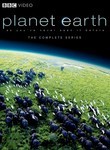
Melody and I finished watching Planet Earth the other day. We had actually finished the series itself in December but just recently got around to finishing up the "Planet Earth - The Future", the companion series talking about environmental and conservation issues. If you haven't seen the series, the photography is just as exquisite as you've heard. The version available on DVD is the BBC one narrated by David Attenborough, rather than the version which aired on the Discovery Channel with Sigourney Weaver.
The series has racked up an impressive array of firsts, including the filming of lions hunting elephants at night, a polar bear attacking a walrus herd, and a blue bird of paradise. They also did some very impressive time-lapse photography, which showed not only the passage of time, but also included the camera panning; an impressive amount of preparation must have been done for those shots.
At the end of each episode was a Planet Earth Diaries documentary, showing what they did to film a particular scene from the episode. We ended up pausing the disc just before to see if we could guess what the topic would be. It's amazing the dedication of the filming crew; one person sat in a hide at least 8 hours a day for a couple weeks to catch a bird of paradise. The results were worth it, of course.
I've heard other people comment that the way the segments are edited and scored with music cause you to sympathize with either the predator or the prey (whichever happened to be focus). I saw how that could be true, but Melody thought I was very contrary to be rooting often for the opposite animal. ("Go, wild dogs!")
The documentaries on the last disc, "Planet Earth - The Future", were obviously geared towards people who would be interested in watching Planet Earth in the first place. However, they did have not only a few people with opposing views, but people who can give both a reasoned view as well as passionate pleas.
Watching Planet Earth reminded me of the old Mutual of Omaha Wild Kingdom TV series and shows by Jacques-Yves Cousteau. I always wondered how hard it is to make the audience empathize with the subjects while not making editorial choices which put too much interpretation into what's going on. Planet Earth seemed, to strike a good balance between relating an animal's behavior to human experiences without going overboard.
One thing that stuck out to me was that the show tended to use a lot of superlatives. Almost every story had one, whether it be the largest mountain range, the rarest mammal, or the forest with the greatest biodiversity. I wonder how many subjects were chosen because they were the largest, rarest, or most diverse, and how many they came up with the superlative afterwards. At least they didn't over-qualify their statements - imagine if they had talked about the rarest large land mammal with cloven hooves and curled antlers which lives over 3,000 feet altitude?!
